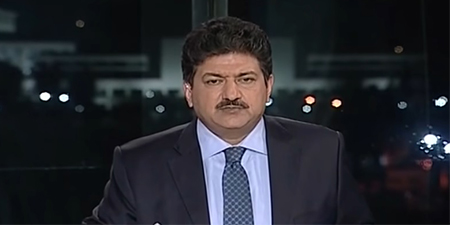Hamid Mir writes against PMDA in Washington Post
JournalismPakistan.com | Published: 23 August 2021
Join our WhatsApp channel
Hamid Mir's article in the Washington Post raises concerns about the new Pakistan Media Development Authority proposed by Imran Khan's government. He argues that this law threatens press freedom and could lead to increased censorship in the country.Summary
ISLAMABAD—Although Pakistan is a democracy, journalists now fear that a crackdown on the media is in the offing, prominent journalist Hamid Mir wrote in an article titled: "The Pakistani media faces a new crackdown" published in the Washington Post.
"The government of Imran Khan is moving ahead with a law to create a new media regulator, to be called the ‘Pakistan Media Development Authority,’ to oversee mainstream and social media," he wrote.
"The million-dollar question is this: Why does Imran Khan need a new regulatory body for the media, and why is the journalistic community so united against it," Mir asked, adding that "The proposed law is just the latest stage of an effort to impose state control over all segments of the media by creating an overcentralized body to be headed by a top bureaucrat of the information ministry."
"According to the new law, all media outlets including social media platforms will require an annual waiver from the government to remain operational. Failure to comply will result in suspension and other penalties. For the first time in Pakistan’s history, special media regulatory authority will be introduced to punish “offenders” from the media with three years’ imprisonment and fines amounting to 25 million Pakistani rupees ($152,000 in U.S. dollars)."
"Yet, journalists can hardly be blamed for suspecting that this law is yet another attempt to legalize censorship. Many analysts think that the new proposed law does not bode well for democracy and that the Pakistani media is entering a new dark age," he noted.
Mir emphasized that Pakistan needs strong and free media to fight the growing threat of extremism. According to him, “Media martial law” will only help those who can’t tolerate the pictures of Malala in our schoolbooks and who don’t want to see democracy in Pakistan flourish. The talk of an impending dark age for the media looks more justified by the day, he concluded.
KEY POINTS:
- Hamid Mir criticizes the formation of the Pakistan Media Development Authority.
- The new law requires annual waivers for media outlets to operate.
- Failure to comply with the law could result in severe penalties.
- The proposed law is seen as a threat to democracy and press freedom in Pakistan.
- Mir emphasizes the need for a strong media to combat extremism.

























